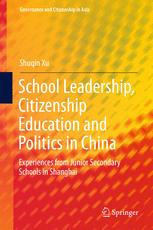

Most ebook files are in PDF format, so you can easily read them using various software such as Foxit Reader or directly on the Google Chrome browser.
Some ebook files are released by publishers in other formats such as .awz, .mobi, .epub, .fb2, etc. You may need to install specific software to read these formats on mobile/PC, such as Calibre.
Please read the tutorial at this link: https://ebookbell.com/faq
We offer FREE conversion to the popular formats you request; however, this may take some time. Therefore, right after payment, please email us, and we will try to provide the service as quickly as possible.
For some exceptional file formats or broken links (if any), please refrain from opening any disputes. Instead, email us first, and we will try to assist within a maximum of 6 hours.
EbookBell Team

4.7
106 reviewsThis book examines and theorizes the dynamics and complexities of leadership in citizenship education in junior secondary schools in Shanghai, China. Specifically, it examines from a macro- and micro-political theoretical perspective the interactions between principals and school party secretaries (SPSs), and how they respond to the demands of macro- and micro-political actors. This qualitative empirical research found four major school leadership/citizenship education scenarios in which principals and SPSs addressed the interests of different macro- and micro-political actors. Moreover, principals and SPSs enjoyed a complicated working relationship at the micro-political (school) level in which they collaborated to fulfill their responsibilities and respond to school macro- and micro-political actors, while competing for power over leadership in citizenship education. Principals’ and SPSs’ leadership in citizenship education was shaped by inter-related factors, including diverse influences in a multi-leveled world, the integration of politics and education, the demands of macro- and micro-political actors, and personal factors. To interpret these findings, this study proposes a theoretical framework for understanding leadership in citizenship education in China as a political exercise. This theoretical framework is useful for understanding the complexity of school and citizenship education leadership, the micro-political relationship between Chinese principals and SPSs, and their dynamic and complex interactions with macro- and micro-political actors.